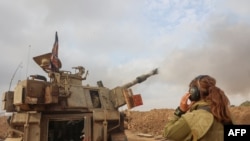Hamas militants from Gaza launched an unprecedented attack on southern Israel on October 7, killing about 1,200 people, mostly civilians, and taking around 240 hostages, according to Israeli officials.
In response, Israel vowed to destroy Hamas and has carried out air strikes and a ground offensive that have killed around 15,900 people, mostly women and children, according to the Hamas-run health ministry.
During the truce, Hamas released 80 Israeli hostages in exchange for 240 Palestinian prisoners.
Twenty-five other captives, mostly Thais, were freed outside the scope of the deal.
The Israeli army said 137 hostages were still being held in Gaza.
On day 60 of the war, here are five key developments from the past 24 hours:
UN says safe zones 'not possible'
The United Nations warned that it was impossible to create safe zones for civilians in Gaza.
"The so-called safe zones... are not scientific, they are not rational, they are not possible," said James Elder, spokesman for the UN children's agency, UNICEF.
On Monday, a UN official warned that humanitarian aid to Gaza could soon grind to a halt.
"The conditions required to deliver aid to the people of Gaza do not exist," Lynn Hastings, UN humanitarian coordinator for the Palestinian territories, said in a statement.
Israeli forces have recently pushed into southern Gaza, "forcing tens of thousands... into increasingly compressed spaces," Hastings said.
Israel denies WHO allegations
The Israeli army denied telling the World Health Organization to empty an aid warehouse in southern Gaza within 24 hours before ground operations in the area render it unusable.
"We didn't ask you to evacuate the warehouses and we also made it clear (and in writing) to the relevant #UN representatives," an Israeli defence ministry body said on X, formerly Twitter.
This came after WHO chief Tedros Adhanom Ghebreyesus wrote on X on Monday: "Today, WHO received notification from the Israel Defense Forces that we should remove our supplies from our medical warehouse in southern Gaza within 24 hours, as ground operations will put it beyond use."
Communications cut off
The main telecom company in the Gaza Strip said Monday that mobile telephone services and internet connections had been cut across the territory.
"We regret to announce that all telecom services in Gaza Strip have been lost due to the cut-off of main fibre routes from the Israeli side," Paltel said in a message on social media.
"Gaza is... blacked out again."
US seeks entry of more fuel
The United States said Monday it was pushing Israel to let more fuel into the Gaza Strip.
Fuel, which powers generators for electricity, and other humanitarian aid had entered the besieged Palestinian territory during the truce.
"We had some very frank conversations with them about the need for fuel to come in and saw some fuel going in Friday" followed by more on Saturday, State Department spokesman Matthew Miller told reporters.
Israel 'not trying to displace' Gazans
Military spokesman Jonathan Conricus said on Monday that Israel was "not trying to displace anyone, we are not trying to move anybody from anywhere permanently."
Many Palestinians fear a repeat of the displacement of more than 760,000 of their people that took place during the war that led to Israel's creation 75 years ago.
"We have provided a designated humanitarian zone inside the Gaza Strip," Conricus said, referring to a tiny coastal area named Al-Mawasi.
Israel Continues Drive to Southern Gaza, UN Says Safe Zones 'Not Possible'

JERUSALEM — Israel pressed on with its expanded ground operation against Hamas in the Gaza Strip Tuesday following the end of a seven-day truce last week.














Forum